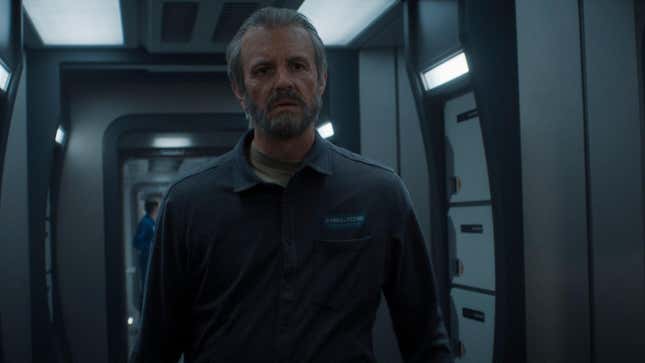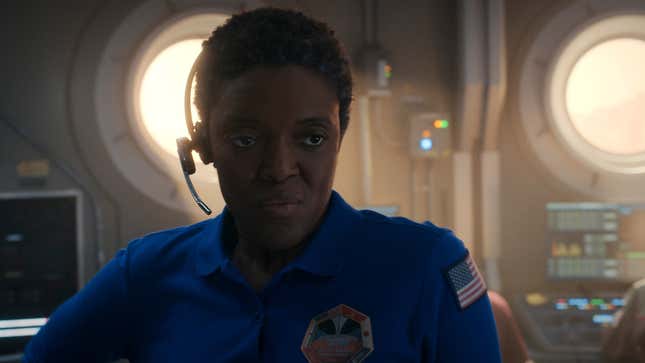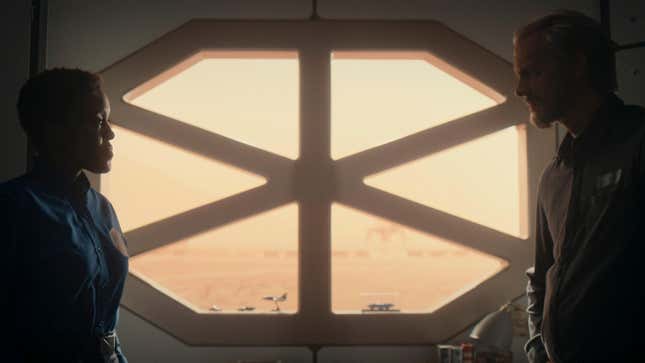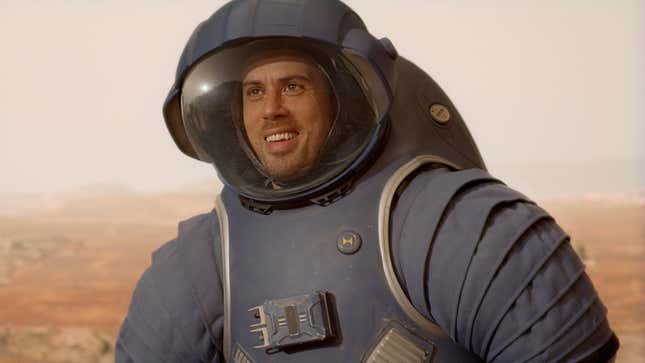That For All Mankind isn’t one of the biggest shows in the world might make sense, if not for other shows like Ted Lasso, The Morning Show, or Severance. All of them are originals released through Apple TV+, one of those streamers maybe you subscribe to while a show is on and then cancel, or mess around with for a year when you get a new iPhone. But, unlike For All Mankind, Ted Lasso, The Morning Show, Severance, and others are pretty damned popular. They win Emmys. They have Funko Pops. By all public measures, they’re hits.
And yet For All Mankind which, for our money, is by far the best of the bunch does not have any of that. In fact, if you asked most people if they’d heard of it, they might say “No.” “It’s a little bit of a bummer,” star Joel Kinnaman told io9 over video chat recently. “It’s sort of how awards culture works. Because the first season of our show wasn’t received in that way, then it kind of fell off the radar for all those things. Very rarely does a show come back into awards conversation. And I think that it deserves to be in those conversations in many aspects. But you know, it is what it is.”
Part of that is because, as absolutely incredible as the 2019 debut season of For All Mankind was—and trust us, it’s amazing—the show’s true potential wasn’t revealed until season two. Created by Ronald D. Moore, Matt Wolpert, and Ben Nediv, For All Mankind’s first season began with a simple, genius premise: what would’ve happened if the United States lost the space race to Russia? What would that have done to our country and the world? Season one showed how the defeat lit a fire under NASA’s ass to do more, culminating in an edge-of-your-seat space rescue that would help the United States take the lead in the future.
That’s just the beginning, though. For season two (and three and four so far) the show elevated itself by not simply picking up the story where it left off. Instead, it jumped ahead about a decade, leaving much to the imagination and letting the world change, characters age, and the impact of what occurred previously really sink in. That means each actor has to play a completely different age, roles are recast, characters die, and we truly get to see how events on the show shifted the entire world in big, meaningful ways over long periods of time.
“That was part of the initial pitch that I got when I sat down with the creators and it was what really drew me to this,” Kinnaman said. “It was a bit frustrating when we released season one because it was so hard to explain what this show is to people. You know, it’s like, ‘Oh, it’s not just like Mad Men in NASA, you know?’ It’s a much bigger, grander vision than that. And so it took a couple of seasons for the show to kind of reveal itself to the audience what it actually is.”

Kinneman stars as Ed Baldwin, an enthusiastic astronaut who is among the first Americans on the moon, branding him a national hero. Then, over the decades, he endures unfathomable tragedies in private as his public persona as a hero only increases. Those big character arcs, and the fact he’d get to play Ed at all different ages, are the biggest reasons why Kinneman was so excited about the project. “Ed Baldwin as a character is this sort of American archetype, this all-American hero on the outside,” the actor said. “But actually on the inside, he is something very different. An emotionally tumultuous man that has difficulty handling his emotions and his rage and his impulsivity. To see the sort of dismantling of this archetype over the course of the seasons [has been rewarding].”
The show is currently in season four and, in the past few seasons, the second lead of the show has evolved to be Danielle Poole, played by Krys Marshall. Danielle was one of the astronauts recruited to help NASA in season one but was more of a bit player at the time. She’s since evolved into a worldwide celebrity herself, the first American on Mars, and a formidable leader. However, Marshall explained to us that the character’s evolution happened on the fly.
“Initially, Danielle wasn’t meant to be an intrinsic character in our story,” Marshall told io9 over video chat. “She was meant to be one of the astronaut candidates. As time went on and I played more, they saw me and the connection that I have with Michael Dorman [who played early season star Gordo Stevens] and with Joel and they wrote more and more and more until now, eventually, Joel and I are the sort of central characters of our story.”

That’s another part of For All Mankind’s magic. While each season starts with a big, basic idea of where the story and characters will go, there are checks and balances in place to change things along the way, making sure the show is at its best at every step of the process. Scripts go through multiple drafts before actors see them. Production shoots two episodes at a time, allowing everyone to see what works, what doesn’t, and adjust for the next few episodes. Then it starts all over again.
“[The creative team] will admit that they have a rough idea of where we will go over the course of the 10 episodes, but it continues to shift,” Marshall said. “The writers are watching what’s coming in on the dailies and picking up on ‘Ooh, that looks really cool.’ ‘I love this connection here.’ ‘Let’s explore this, this, expand that’ or ‘This doesn’t work, okay, let’s truncate that part of the story’… So I can press them all I want to for ideas about what’s going to happen in the season but even they themselves don’t know.”
What that often means is characters who start the season as main characters might not survive to the end and several, if not the majority, of characters who started with the show on season one are no longer there. “It’s something that I love that our writers do is that they’re ruthless,” Marshall said. “You love Tracy and Gordo? Great. They’re killed. You love Molly Cobb? Good. She’s dead. I think that’s great, you know? Because that’s what happens in real life.”

Both Marshall and Kinneman are pessimistic about whether their characters, now senior citizens in the current, 2003-set fourth season, will survive much longer. “Anybody can die at any time,” Marshall said. “Danielle doesn’t have some invisibility cloak that prevents her from dying. It will be as big of a surprise to me as it is to you.” Kinnaman felt similarily while embracing the show’s potential. “It depends on how long the show goes, you know?” he said. “They gotta find the Fountain of Youth on one of Saturn’s rings [chuckles] or something like that for him to go on. I don’t know how much further he can go, but, yeah, we’ll see. Only the future will tell.”
The future of For All Mankind is, arguably, the most exciting thing about it. As the show gets further along in its story, the creators keep coming up with more fascinating, bombastic goals of how far Earth can get into space. First it was the moon, then it was Mars, now a rogue asteroid. What comes next? “Ron’s always spoken very openly about his hope for the show to have seven or eight seasons, which would take the time for us to get up to the present day,” Marshall said.
Showing what 2023 would look like in the alternate For All Mankind universe would be incredibly cool. The ultimate “what if?” But Kinnaman wants just a little bit more. “The sort of grand vision for this show would take us from the space race and then an official hand over to Star Trek,” he said, half-joking, but half not.

And after speaking to the show’s stars you begin to understand why For All Mankind is both one of the best shows on TV, and also not the runaway success it should be. For starters, it’s not an easy show to explain. It’s also incredibly ambitious, maybe to a fault, constantly adding new characters, changing the established ones, and more. But if you can just accept that, few shows tell stories that are this glorious, imaginative, and hopeful. Many of the most popular shows these days focus on the worst of people. For All Mankind says, in spite of all that, don’t forget humanity is capable of great things. Of letting people travel to the moon. Creating a colony on Mars. Capturing an asteroid. In the right hands, and under the right circumstances, it can go beyond what most of us could ever imagine. Maybe, one day, that’ll also be the case for the show itself.
For All Mankind is currently in the middle of what’s so far been a dynamite fourth season. No word yet on a fifth or sixth (which would take the show to the present) season—but, channeling a bit of the show’s optimism, we hope they happen.
Want more io9 news? Check out when to expect the latest Marvel, Star Wars, and Star Trek releases, what’s next for the DC Universe on film and TV, and everything you need to know about the future of Doctor Who.
Trending Products

Cooler Master MasterBox Q300L Micro-ATX Tower with Magnetic Design Dust Filter, Transparent Acrylic Side Panel, Adjustable I/O & Fully Ventilated Airflow, Black (MCB-Q300L-KANN-S00)

ASUS TUF Gaming GT301 ZAKU II Edition ATX mid-Tower Compact case with Tempered Glass Side Panel, Honeycomb Front Panel, 120mm Aura Addressable RGB Fan, Headphone Hanger,360mm Radiator, Gundam Edition

ASUS TUF Gaming GT501 Mid-Tower Computer Case for up to EATX Motherboards with USB 3.0 Front Panel Cases GT501/GRY/WITH Handle

be quiet! Pure Base 500DX ATX Mid Tower PC case | ARGB | 3 Pre-Installed Pure Wings 2 Fans | Tempered Glass Window | Black | BGW37

ASUS ROG Strix Helios GX601 White Edition RGB Mid-Tower Computer Case for ATX/EATX Motherboards with tempered glass, aluminum frame, GPU braces, 420mm radiator support and Aura Sync










